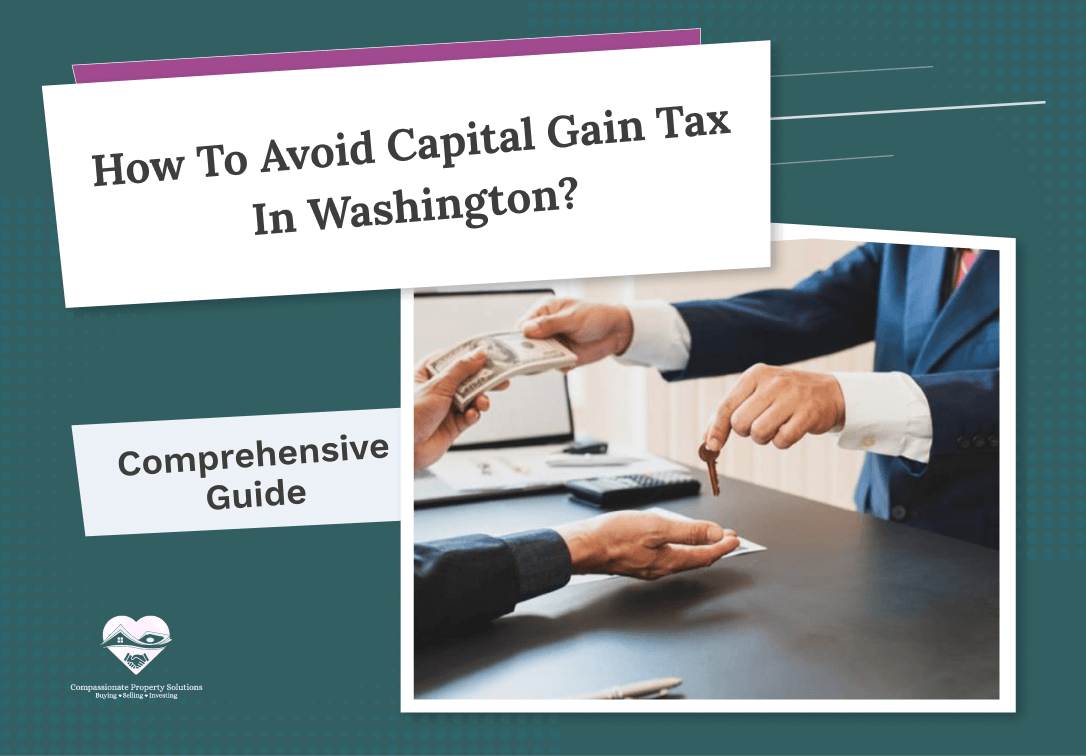How to Reduce Capital Gain Tax in Washington?

Since the landmark year of 2020, Washington State has undergone a pivotal transformation in its capital gains tax landscape, evolving into a more complex framework by 2024. This marked a significant departure from its previous stance of not imposing a specific capital gains tax, with the current rate reaching up to 7% on certain gains.
This shift presents both unique challenges and opportunities, especially for those in the real estate sector saying, “we buy fast, for cash.” Understanding these changes is crucial for residents and investors looking to make a “fair offer” and navigate the state’s vibrant economy with ease.
Decoding the Complexities of Capital Gains Tax in Washington
Capital gains tax in Washington is levied on the profit from selling assets, such as property, with distinctions between short-term and long-term gains based on the ownership period. This differentiation is crucial for Washington residents.
Washington’s capital gains tax, as of 2024, emphasizes the importance of strategic financial planning. For residents, understanding both state and federal tax laws is essential to navigate this landscape “easily” and effectively.
Strategies to Minimize Capital Gains Tax
Primary Residence Exclusion: Leveraging the Primary Residence Exclusion offers a significant advantage, allowing up to $500,000 of capital gains to be excluded for married couples.
Offsetting Gains with Losses: A tactical approach to managing tax liabilities, this strategy “easily” allows residents to balance gains with losses, optimizing tax implications.
Compassionate Property Solutions stands at the forefront of understanding the nuances of Washington State’s real estate market and capital gains tax strategies. Our expertise ensures that your investment journey is “easy,” guiding you through optimizing financial outcomes.
8 Ways You can Avoid Capital Gain Tax in Washington State
- Utilize the Primary Residence Exclusion
The Primary Residence Exclusion under federal law is a significant benefit for homeowners in Washington State. If you sell your primary residence, you can exclude up to $250,000 of capital gains from your taxable income, or up to $500,000 for married couples filing jointly. To qualify, you must have lived in the residence for at least two of the five years preceding the sale.
This provision is especially advantageous in Washington’s robust housing market, offering substantial tax relief to homeowners and encouraging property investment. Leveraging this exclusion can lead to significant financial savings and is a key strategy in capital gains tax Washington State planning.
- Invest in Opportunity Zones
Opportunity Zones in Washington State present a unique investment opportunity with attractive tax benefits. These zones are designated areas where investments are encouraged through tax incentives to foster economic growth and development. By investing in an Opportunity Zone, you can defer, reduce, or sometimes completely eliminate capital gains tax on certain investments, provided they are held for a predetermined period.
This initiative supports economic development in underprivileged areas and offers investors a chance to reduce their tax liability while contributing to the community. Strategic investment in these zones can be a wise financial decision for forward-thinking investors.
- Take Advantage of Tax-Deferred Exchanges
When dealing with capital gains tax on real estate in Washington State, it’s important to understand the exemptions and rules that apply. Engaging in a 1031 exchange, or a like-kind exchange, is a savvy strategy for real estate investors. This provision allows you to defer capital gains taxes when you sell an investment property and reinvest the proceeds into another property.
Ideal for Washington’s dynamic real estate market, this method enables investors to continually upgrade their portfolio without immediate tax repercussions. The 1031 exchange is particularly advantageous for those looking to expand or shift their real estate investments over time, allowing for growth and diversification of assets while deferring tax liabilities.
- Offset Gains with Capital Losses
Capital loss harvesting is an effective strategy to manage tax liabilities in Washington. You can offset the capital gains realized in the same fiscal year by selling investments at a loss. This approach can significantly reduce your overall capital gains tax burden. It’s a tactical method that requires careful timing and consideration of market trends.
By balancing gains with losses, investors can optimize their tax situation, turning potential financial setbacks into opportunities for tax efficiency. This strategy demands a proactive and informed approach to investment management, making it a key consideration for savvy investors.
- Consider Long-Term Investments
Focusing on long term capital gains tax washington state investments can lead to substantial tax savings. Short-term capital gains, from assets held for less than a year, are taxed at a higher rate compared to Washington long term capital gains tax rates. By holding investments for over a year, investors can benefit from lower tax rates on their capital gains.
This approach encourages longer-term investment strategies, aligning with a more stable and growth-oriented financial planning. It’s especially advantageous in Washington’s economy where long-term investments can yield significant returns. This strategy not only fosters financial growth but also optimizes tax liabilities, making it a cornerstone of smart investing.
- Explore Retirement Accounts
Investing in retirement accounts such as IRAs or 401(k)s is a beneficial strategy for residents in Washington. These accounts offer tax-deferred growth, meaning the investments within these accounts accumulate without immediate tax implications. While this approach doesn’t directly avoid capital gains tax, it allows for the efficient growth of investments over time.
By contributing to these accounts, individuals can secure their financial future while taking advantage of the tax benefits. This strategy is particularly effective in Washington, where residents can utilize these accounts to build a robust financial portfolio, ensuring a more secure and comfortable retirement.
- Gift Assets Strategically
In Washington, strategically gifting assets can be an effective way to minimize capital gains tax. Transferring assets to family members in lower tax brackets can reduce the overall tax burden. However, being aware of federal gift tax rules and basis transfer regulations is crucial.
This method requires careful planning and understanding the tax implications for both the giver and the recipient. When executed correctly, gifting assets can be a powerful tool in financial planning, allowing for the efficient transfer of wealth while minimizing tax liabilities.
- Charitable Contributions
Donating appreciated assets to charity is a commendable and tax-efficient strategy in Washington. By making charitable contributions, you can avoid capital gains taxes on those assets and receive a charitable deduction. This approach benefits the recipient organization and provides significant tax advantages to the donor.
It’s an excellent way for individuals to support causes they care about while efficiently managing their tax obligations. This method of giving is especially beneficial in a state like Washington, where philanthropy and financial prudence can go hand in hand, enabling donors to make a positive impact while optimizing their tax situation.
Conclusion: Maximizing Financial Benefits in Washington’s Tax Landscape
This guide aims to provide valuable insights into navigating Washington State’s capital gains tax. It’s essential to stay informed and proactive, consulting with professionals to tailor strategies that best suit your financial goals in this evolving landscape.














